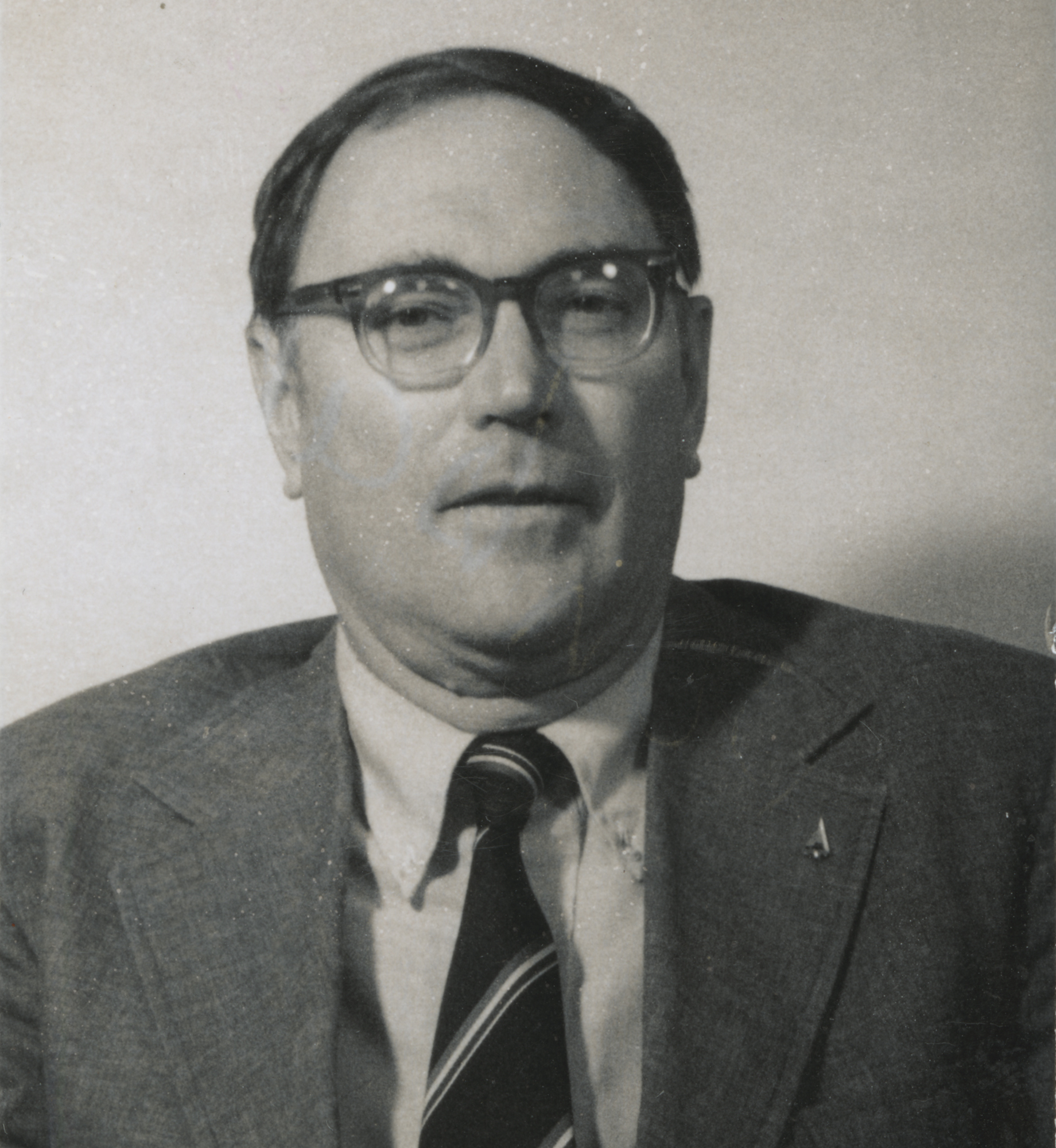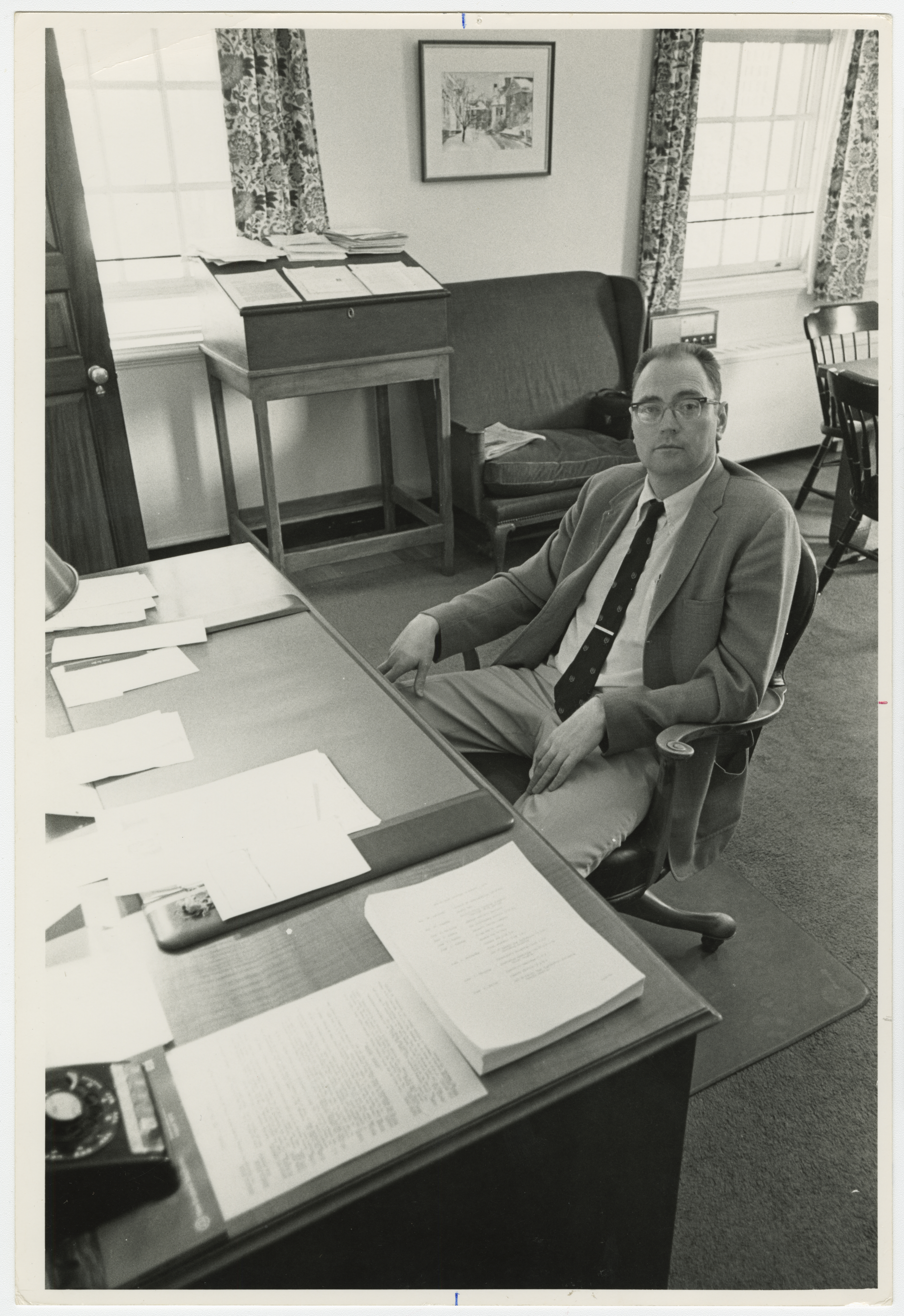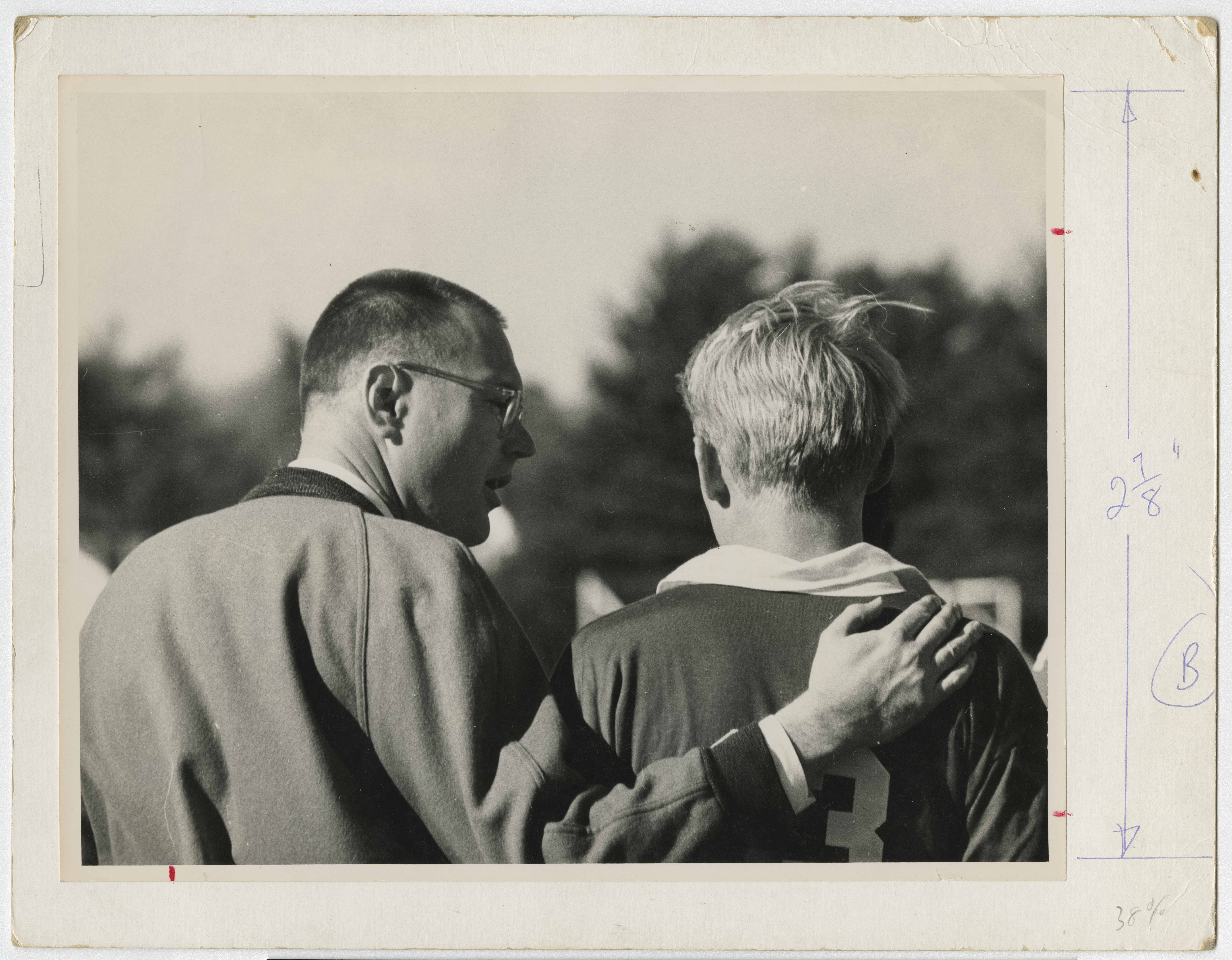DONALD C. DUNBAR
1927–2018
 Chair of the Department of Mathematics, Emeritus. Dean of Students, Emeritus. Director of Summer School, Emeritus. 1981 Independence Foundation Professor. Instructor in Mathematics Emeritus 1955-1993.
Chair of the Department of Mathematics, Emeritus. Dean of Students, Emeritus. Director of Summer School, Emeritus. 1981 Independence Foundation Professor. Instructor in Mathematics Emeritus 1955-1993.
The epitome of what was traditionally considered a “school man,” Don Dunbar was literally born into the world of independent schools. Born in 1927 to Douglas and Mary Dunbar, Don grew up with his older brother Doug on the Cheshire Academy campus in Connecticut where his father was a mathematics teacher. At the end of Don’s ninth-grade year, his father took a position on the faculty at Phillips Academy, Andover. During his three years as a student at Andover, Don excelled both academically and athletically. A standout baseball player his entire childhood, Don also decided to try soccer for the first time as an Andover senior and was a natural as a defending halfback.
As an undergraduate at Amherst College, Don continued to play soccer and baseball, earning All-American honors as a soccer halfback in 1950, his senior year. He also received a tryout as a pitcher for a major league club. Instead of playing minor league baseball, Don went to Harvard to earn his M.A. He taught at Lawrenceville and Westminster schools before accepting an appointment to Exeter’s Mathematics Department in 1955. Having married the love of his life, Dot Loomis, in 1951, Don arrived on campus with his wife and two young sons, David and Scott. Daughter Cathy was born in 1958. All three Dunbar children graduated from PEA and—like their father and grandfather before them--went on to become teachers. Spring term 2021, marked 100 consecutive years in which a Dunbar had served in the classroom.
In a career that stretched from 1955 to 1993, Don numbers among the most impactful members of the Academy faculty in the 20th century. Embodying the proverbial “triple threat,” he taught math classes; coached varsity soccer, helped in basketball and baseball; served on innumerable faculty committees; and spent thirty years as head of McConnell Hall. In fact, most of those years in McConnell South, he was the sole resident faculty member at a time when there were no affiliated dormitory advisors to ease the burden of duty or advising. In other words, he was always on duty. If we tally up Don’s boyhood at Cheshire, his teenage years at Andover, and his adult career as a boarding school teacher, Don spent over 50 years living in dormitories.
In 1955, it would be fair to describe Exeter’s faculty as primarily older men who were appointed in the 1930’s. Don’s relative youth served him well, his affability and youthful enthusiasm distinguishing him among his colleagues. Students found him highly approachable both in and beyond the classroom. Teacher, mentor, and coach, he trusted people to learn how best to manage their lives. He prepared his students, his players, and his children for the journey that lay ahead.

This is how one member of the Class of ’63 remembers Don:
“Mr. Dunbar was among a handful of younger faculty who, with their wives and children, brought a warmer, more supportive and accessible presence. I was both coached and taught by Don, and recall him fondly as energetic, a serious but relaxed teacher, extremely good humored, always upbeat, interactive, and encouraging.”
In 1963, Don ventured off to Stanford to work on a second Master’s degree. He loved his time in California and he loved Stanford, becoming, upon his return to Exeter, an unofficial ambassador for that West Coast school. From 1966-1969 he gained invaluable administrative experience, serving as Director of the Summer School. This experience subsequently led Principal Richard Ward Day to appoint Don to one of the most critical positions within his administration: in 1970, Don Dunbar became the Academy’s first Dean of Students. That Fall, at the dawn of Exeter’s immersion into coeducation, Don began his tenure as Dean at precisely the same moment when our first cohort of 40 girls joined the campus community. At the time, the entire Dean’s Office consisted of Don, a young Assistant Dean new to the Academy, and two administrative assistants. There was no Dean of Residential Life, nor of Health and Wellness. There was no Academic Dean. The Office of Student Activities did not yet exist, and the very first Psychological Services Counselor would not be appointed for another 6 years. All matters of communication, out of towns, attendance, discipline, and grades were managed by this group of four in the Dean of Students’ office, and they did so without the help of computers.
For the nation at large, the early ‘70s were turbulent times, nowhere more prominently than on college and prep school campuses. Thus, the Dean of Students often found himself addressing disciplinary cases. All major cases, those that might result in expulsion, were presented to the entire faculty for discussion and vote. As in every aspect of his career, Don managed this huge responsibility with competence, consideration, and kindness. This challenging time became a catalyst for change, and Don Dunbar was instrumental in helping Exeter move from a mostly punitive disciplinary system to one that nurtures growth and education. No doubt, he would be quite proud of the way in which our current approach to discipline has evolved. Here is how one student from the Class of ’74 remembers Don:
“In the uneasy climate of mistrust between students and faculty that then hung like a fog around the campus, “Dean Dunbar”, as I would come to know him, stood out as a beacon of decency and kindness in a world that at times seemed wanting in both. He was my soccer coach for three years and one of the teachers I encountered most regularly around campus. I remain grateful to him for it to this day, both for the kindness and for the education.”
After completing his 5-year appointment as Dean, Don served for another five years as Chair of the Mathematics Department. Having completed his tenure as Department Chair, Don spent the 1982-83 academic year on an exchange to Melbourne, Australia. This was his 2nd time in Australia, having previously taught in New South Wales during 1969-70 school year. The Aussies joined Amherst and Stanford on Don’s list of beloved experiences.
Unapologetic in his love for Amherst and Stanford, he often encouraged students to apply and actively lobbied on their behalf to help them gain admission. In the era of the ‘50s, ‘60s and ‘70s, a call or letter from Mr. Dunbar to an admissions office could make all the difference.
Here, for example, is the recollection of one member of the Class of ’66:
“Mr. Dunbar was instrumental in getting me into college. When the recruiters came to Exeter in the fall of my senior year, Don encouraged me to interview, telling me at the time that he had said “something” to Rixford Snyder, then the Admissions Director at Stanford, about me. Along with 23 of my classmates, I was accepted at Stanford, attended and loved it. Without Don’s gentle push I never would have imagined leaving New England and the East Coast. In retrospect, it was the best life decision I could have made.”
In the later stages of his career, Don concentrated on teaching, mentoring young faculty in his department, and coaching JV boys squash with close friend Hammy Bissell. They surely formed the most experienced JV coaching duo ever, and without a doubt they delighted their players with incredible stories of the past. Don also spent time playing tennis and squash with his close faculty friends. Not surprisingly, Don was a smooth and agile racquets player who could easily hold his own in competition with much younger colleagues.
After retiring in 1993, Don and Dot split time between their Brentwood home and their Great East Lake cottage on the border of Maine and New Hampshire. Winters they often spent vacationing in Hawaii with Don’s brother Doug and his wife. During the many years of his retirement, Don stayed connected to the Academy as a regular attendee at opening assemblies, math department parties, and class reunions. Don kept all his old friends up to date on the lives and careers of his children and grandchildren, in whom he took so much pride.
Here is a remembrance from one of those alumni reunions.:
“I was a member of the 1964 varsity soccer team at Exeter, coached by Mr. Dunbar. While I was good enough to make the team, and play some, I was hardly a star. I never had a class with Mr. Dunbar, and did not live in his dormitory, so my only real contact with him was the 1964 soccer team. I returned to Exeter for my 50th reunion and one of my classmates pointed out an elderly gentleman sitting at one of the tables after dinner. My classmate told me it was Don Dunbar. Since I did play soccer for Mr. Dunbar, I went over and introduced myself. This is the conversation as I remember it:
Me: Hello Mr. Dunbar, I'm Tom. I played soccer for you in 1964.
Mr. Dunbar: Well hello Tom Gasparini (big smile). It's good to see you. I think you were an Inside Forward on that team that beat Andover that year.
I sat down and we chatted. The point of this story is that Don Dunbar, more than fifty years later, remembered an undistinguished member of one of his soccer teams. He not only knew who I was, but what position he had me play. Only a coach, a teacher, who really cared about his players, or students, would be able those many years later to reconnect in such a personal way. That brief conversation with Don Dunbar was one of the highlights of my 50th Reunion.
In the fall of 2017, Don’s beloved Dot passed away. Don died a year later. They had been married 66 years.
Husband, father, grandfather, brother, teacher, colleague, and friend, Don Dunbar left a rich and enduring legacy. As we bring this Memorial Minute to a close, it is fitting to share with you a few more of the many remembrances offered by his former students to this committee:
One of his former soccer players writes: “I was a four-year Hammy Bissell newspaper boy from Wisconsin who had never played soccer. Don brought to soccer defense and keeper coaching his love of mathematics and its applications: angles, areas, distances, velocity, and more. Because of Mr. Dunbar, I was sold on becoming a goalkeeper, and it became a passion. I went on to play four years at Harvard, and a season of semi-pro in NYC afterwards”
A member of the Class of ’66 remembers Don fondly: “I was new to soccer and made the team based on my ability to run and kick people in the shins. Mr. Dunbar coached me actively even though I wasn't a starter, and encouraged me to play in college (which I did for 3 years). He never tired of kidding me about being a "shin barker,” but he spontaneously took on the role of my college counselor resulting happily in early admission to Amherst. We connected a few times after Exeter, and he was unfailing in his warmth, interest and mutual memories. He was the complete package, and I'm very grateful for the mentor and model he was to me, particularly since I lost my father at age 4.”
Here is a note from another of Don’s student athletes: “Don Dunbar was a very important part of my life as a student at Exeter. I’d never seen a soccer game when I arrived as a prep in 1960. In the fall of 1961, I went to the first day of varsity soccer tryouts. After that first day, I decided that I didn’t have a chance to make the varsity so I skipped the second day of tryouts. That night Don came to my room on the top floor of Cilley Hall and asked me why I hadn’t come. I said that I wasn’t good enough and certainly wasn’t experienced enough to be a serious candidate for the team. He said to me something that has stuck with me for 60 years and has influenced me throughout my life. “How about if you just come out and play, and let Mr. Heath and me make the decision.” I made the team, and became a starter the next year on a team that beat Andover. Don, who had been a superb college soccer player, had seen something in me that I didn’t know was there, and in the process had taught me some life lessons. Try your best. Work hard. And let the chips fall where they may. . . . Don Dunbar was a great school-person who certainly inspired me.”
An alumnus from the class of 1970 writes:
“I had Mr. Dunbar as a soccer coach and Math teacher while I was at Exeter. I remember Mr. Dunbar as an excellent teacher and coach. He was positive, instructive, and very caring about us students. One thing that I remember the most is that on occasion he would close the math book in the middle of class to have a conversation with us about something that was going on in the world. If I recall correctly, he played a recording of Martin Luther King’s speech one time. I had never heard it before. It made quite an impression on me. He was a great teacher of Math and also a great teacher about life.”
And finally a recollection from a fellow named Bill Rawson, Class of ’71: “Don was a mentor to me as a student, and again when I was in the Admissions Office, and I am certain he was the one who suggested Lew Hitzrot write to me about the position. Don was a mentor to many young faculty. He kept a picture in his study of soccer teams that defeated Andover – only those teams – but they were the clear majority of the teams he coached.”
On behalf of the Committee, I ask that this Memorial Minute be spread upon the minutes of this faculty meeting and that copies be given to Don’s three children.
Respectfully submitted,
 Eric Bergofsky (Chair)
Eric Bergofsky (Chair)
David Arnold
Bill Campbell
Spruill Kilgore
Doug Rogers
Tom Seidenberg
Editor's note: This is a full, unedited version of this Memorial Minute. A version of this article first appeared in the winter 2022 issue of The Exeter Bulletin.
